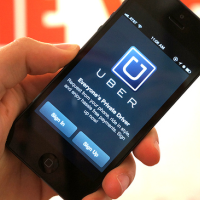Fight over Ride-Share Companies, like Lyft and Uber, Shifts to Courts

New app-driven, ride-sharing alternatives to taxis—like Lyft, Uber and SideCar—have been battling the state, cities and cab companies over their right to compete for business. Now the battle has been joined by the people who drive for them and the battlefield includes the courts.
The state Public Utilities Commission (PUC) briefly tried to stall the startups that are popping up in cities across the country, then relented, at least temporarily. San Francisco, after a moment of doubt and pain, embraced them. And Los Angeles officially banned them, but couldn’t stop them from operating. While all that drama plays out in city halls and state legislatures, a new wave of opposition has emerged and is going to court to make their case.
A class-action lawsuit was filed in San Francisco last month against Uber by two drivers who claim that the company cheats them out of money by banning tips. Uber’s website says its fares already include a 20% gratuity. The drivers also claim that they are being unfairly categorized as independent contractors, depriving them of access to unemployment insurance and workers’ compensation.
Another lawsuit, filed last week against Lyft, makes many of the same arguments. The suit, filed in U.S. District Court for the Northern District of California, argues that the people who drive for Lyft should be considered employees and be allowed to collect tips, get wage statements and receive reimbursement for mileage. They are asking for $11 million in damages.
While each of the ride-share companies has a slightly different business model, fueled by venture capital, they all maintain that they are basically app companies whose software facilitates the businesses of independent contractors.
Uber, Lyft, Sidecar and startups like them use variations on a common theme: Hailing a cab with a smartphone app is much faster than waiting for a cab service to dispatch someone from its fleet. And people who summon a vehicle can watch its approach on their phones.
Local and state authorities are nowhere close to coming up with a regulatory framework for ensuring fair rates, insurance, safety, reliability and fairness while not illegally impairing the application of new technology. While they continue to sort things out, the courts are now weighing in on an industry that didn’t exist two years ago.
–Ken Broder
To Learn More:
Lyft Sued by Driver Who Says He’s an Employee, Not a Contractor (by Patrick Hoge, San Francisco Business Journal)
Lyft Sued for Unfair Competition and Labor Violations (by Rachel Swan, SF Weekly)
Uber Drivers File Class-Action Suit over Tips (by Joshua Brustein, San Francisco Chronicle)
App-Driven Taxi Services Swarming L.A. Cite State Support in Defying the City (by Ken Broder, AllGov California)
- Top Stories
- Controversies
- Where is the Money Going?
- California and the Nation
- Appointments and Resignations
- Unusual News
- Latest News
- California Forbids U.S. Immigration Agents from Pretending to be Police
- California Lawmakers Urged to Strip “Self-Dealing” Tax Board of Its Duties
- Big Oil’s Grip on California
- Santa Cruz Police See Homeland Security Betrayal in Use of Gang Roundup as Cover for Immigration Raid
- Oil Companies Face Deadline to Stop Polluting California Groundwater





